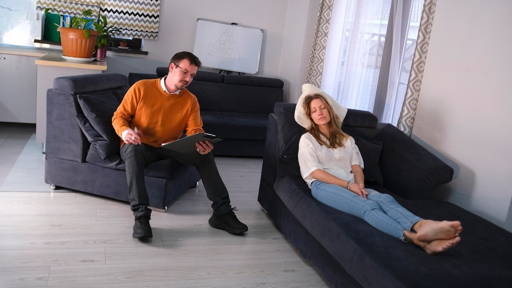Social media platform TikTok has become a popular source of information about mental health, especially among young people. But recent research by The Guardian shows that the platform also contains a worrying amount of misinformation. Of the 100 most popular TikTok videos with the hashtag #mentalhealthtips, more than half (52%) contain incorrect or potentially harmful information. The research was conducted in collaboration with clinical psychologists, psychiatrists and academics, who assessed the videos for scientific accuracy.
The videos included claims about quickly recovering from trauma, misuse of psychological terms and the promotion of dietary supplements without any scientific basis or reference. A striking example is a video in which eating an orange in the shower was recommended as a way to reduce anxiety. Other videos claimed that trauma can be healed within an hour or that normal feelings such as sadness or anger indicate serious mental disorders such as borderline personality disorder.
According to David Okai, neuropsychiatrist and researcher at King's College London, many of these videos confuse well-being with clinical disorders. ‘By using therapeutic language inaccurately, confusion arises about what exactly a mental disorder is,’ he says.
Social media under fire
The (excessive) use of social media by children and young adults – and the associated potentially harmful consequences for (mental) health – has been under fire for some time. More and more countries are considering ways to protect young children in particular from the influence of social media platforms such as TikTok, Facebook and Instagram.
In Australia, this has already led to a ban on the use of social media for children under the age of 16. This is also being discussed in the Netherlands, but for the time being, it is not on the agenda. However, there are various initiatives to make young people aware of the potential dangers of (excessive) social media use. A few weeks ago, Zilveren Kruis, a Dutch health insurer, launched a campaign to make young people aware of the impact of social media on their mental health.
The nuance disappears
A striking point from The Guardian's research is the dominance of short, visually appealing videos that reduce complex conditions to simple “soundbites”. This removes the nuance that is essential in mental health care. Amber Johnston, psychologist and trauma specialist, emphasises that the tips presented are often generalised. ‘Post-traumatic stress disorder (PTSD) is highly individual and requires professional guidance. TikTok, on the other hand, suggests that there are universal, quick fixes.’
The results have led to widespread social and political concern. Parliamentarians such as Paulette Hamilton (Labour) and Victoria Collins (Liberal Democrats) call the findings ‘worrying’ and ‘damning.’ They are calling for tighter regulations through the British Online Safety Act. This law requires platforms such as TikTok to take active measures against illegal and harmful content – a task that, according to experts, is currently falling short.
Prof. Bernadka Dubicka, head of online safety at the Royal College of Psychiatrists, emphasises the importance of access to evidence-based information. ‘Mental health conditions can only be diagnosed by recognised professionals, not through self-diagnosis on social media.’
TikTok's response
TikTok defends itself by stating that the platform offers people the space to share their own experiences. A spokesperson for TikTok says: ‘We work closely with organisations such as the NHS and WHO to promote reliable information. We proactively remove 98% of harmful content.’
Nevertheless, experts are concerned about the algorithm that continues to recommend misleading content even after videos have been removed. Chi Onwurah, chair of the Parliamentary Committee on Technology, emphasises that ‘the amplifying effect of algorithms on harmful content is still not being adequately addressed.’
Stricter content regulation
The study highlights the tension between digital accessibility and medical reliability. Although social media such as TikTok lower the threshold for discussing mental health, this study shows that these platforms can simultaneously contribute to misinformation and confusion. The need for better digital health literacy and stronger content regulation is clear.
At a time when young people are increasingly turning to social media for health information, it is essential that platforms, policymakers and healthcare professionals work together to create a safe and reliable digital environment.







